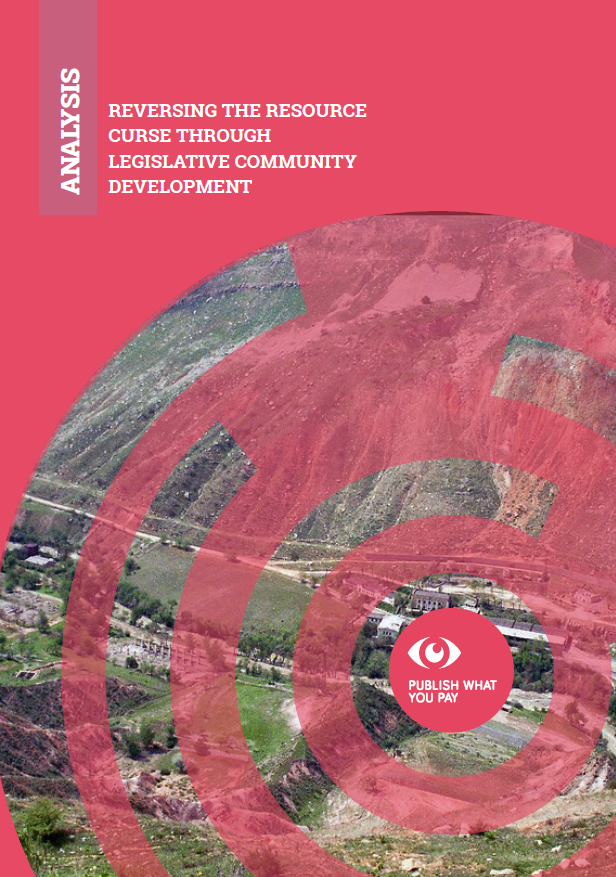The launch of the first ever published EITI report in Ukraine in December 2015 offered a golden opportunity to look back at the progress accomplished so far and to look ahead at the actions still needed to generate genuine openness and accountability in the Ukrainian oil, gas and mining sectors.
In recent times, Ukraine has often made it into the headlines for negative reasons. With an unnerving conflict in the Eastern part of the country and the ongoing economic downturn, there was not much positive to report about. Nonetheless, Ukrainians and, in particular, civil society remain undefeated and have been ceaselessly campaigning for a better management of the natural resources exploited in Ukraine. Despite numerous challenges, civil society actors have put many efforts into engaging government bodies and extractive companies on the need to improve accountability in the oil, gas and mining sectors. It therefore comes as no surprise that civil society has become the driving force of the implementation of the Extractive Industries Transparency Initiative (EITI), a global multi-stakeholder initiative that Ukraine officially joined in 2013. After having overcome many challenges in collecting the relevant data, the first ever EITI reconciliation report – which brings together what extractive companies pay to access natural resources and what different Ukrainian government entities receive in exchange – was published early December 2015. This first EITI report is the first time that the Ukrainian population will have access to important information about the development of oil and gas are in their country and how the sector contributes to the Ukrainian economy and state budget.
The 2013 data in the published EITI report shows how much Ukraine has earned from oil and gas industry that year. With a production of 3 million cubic meters of oil production and 21 million cubic meters of gas production for 2013, the industry has paid more than UAH 25 billion, or just over US $ 1 billion, in taxes, which is the equivalent of the Ukrainian 2015 defence budget. Direct contributions of the oil and gas extraction sector to Ukraine’s GDP amounted to 1.3%.
The report goes on explaining how Ukrainian regions, called oblast, can also benefit from oil and gas exploitation. Of the 17 taxes included in the scope of the 2013 report, seven actually go directly to regions where extraction is taking place: Ivano-Frankivsk, Lviv, Poltava, Sumy, Kharkiv Oblasts. For Ukrainian citizens, and in particular those living close to extractive sites, it is a first to find out how much money goes to their local budget. Benefits from hydrocarbons do not only come in the form of monetary contributions to the state funds, they also include the creation of job opportunities. In 2013, 55 600 Ukrainians were active in the country’s oil and gas sector, amounting to the population of an average Ukrainian city.
Even more importantly, the report reveals the great potential of the extractive sector for Ukraine. From the 410 fields that were commercially operated in 2013, only 252 fields (61%) were generating revenues for the state. The remaining fields were divided up among those in the state of exploration (108 fields – over 25%) and those suspended (50 fields – 12%). This means that with sufficient investments, the extractive sector could quickly become a driving force of the economy, while also ending Ukraine’s energy dependency, provided though that the sector is well managed. This is where the biggest challenges for Ukraine lies. Overcoming the tensions with Russia does seem to be an obvious first step towards stability but is only part of the solution.
Old habits die hard and despite the exciting achievement of having published a first EITI report, opacity in the sector prevails. The EITI report falls short of many disclosure requirements under the EITI Standard. No data was compiled for the mining sector for instance, although the intention is that coal in particular will eventually be covered by EITI reporting. Only a third of the 120 identified private companies were willing to voluntarily disclose information about their operations. Only half of state enterprises were willing to communicate their data to the independent reconciler while many local state entities simply refused to cooperate. Mistrust and tension between all parties are still dominating in the extractive industry.
This is why civil society in Ukraine can’t solely relied on a voluntary disclosure mechanism such as the EITI. The Ukrainian PWYP coalition, with the Dixi Group, a think tank with a special focus on Ukraine’s energy sector, has actively sought to advance mandatory legislation and was able to land some major victories in this in 2014 and 2015. In October 2014, the Law on Amending Certain Legislative Acts Related to Identification of Ultimate Beneficiaries of Legal Entities and Public Officials was adopted, required companies, including those operating in the extractive sector, to disclose their real owners. This was a tremendous step forward and has put Ukraine in a leadership position in fighting dodgy deals enabled by secret ownership structures.
“Disclosing the information about beneficial owners will make business not only more transparent, but also more responsible.” Olena, Pavlenko
“Disclosing the information about beneficial owners will make business not only more transparent, but also more responsible. The real owner will not be able to hide, s/he will be accessible to lawyers and journalists and will understand her/his responsibility for any violations made by the company in the country. When the business has a concrete face, it is always easier to talk about fair rules of the game. Moreover, you will never be successful in breaking up monopolies if you don’t know who the players are. For the Ukrainian energy sector it is one of the most important objectives now, and we are waiting for the disclosure of this information.” – says Olena Pavlenko, Dixi Group.
The fact that the international Board of the EITI, who met in Kyiv on the 9th and 10th of December, discussed making the disclosure of beneficial ownership a requirement under the EITI Standard was therefore no coincidence. Although important technical aspects, such as the timeline for when this would become mandatory for all EITI implementing countries, remain to be determined, the EITI Board strongly supported the need to identify the real owners of companies bidding for, operating in and investing in the oil, gas and mining sectors.
In addition, the PWYP coalition is currently pushing for mandatory disclosure of extractive revenues, in alignment of the EU Transparency and Accounting Directives adopted in June 2013. A draft law has already been prepared in partnership with the Ministry of Energy and Ukrainian NGOs and published on the Ministry’s website for public discussions. “We do expect that the draft law will come to the Parliament soon, and will work with Members of Parliament to adopt it by the middle of 2016” – says Olena Pavlenko.











